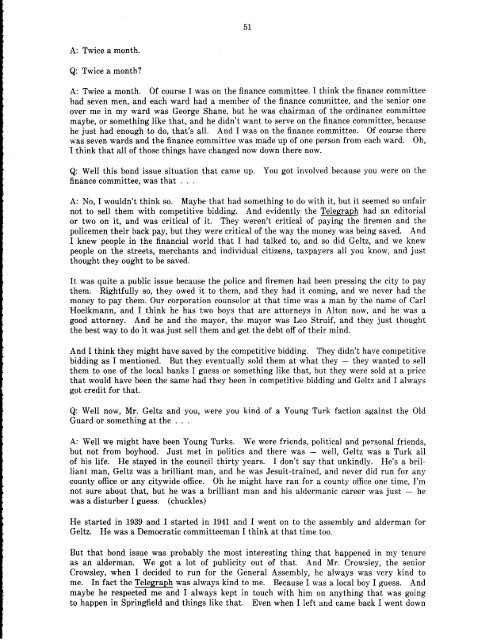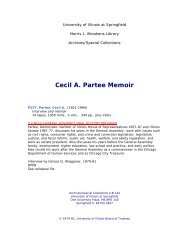Leland J. Kennedy Memoir - University of Illinois Springfield
Leland J. Kennedy Memoir - University of Illinois Springfield
Leland J. Kennedy Memoir - University of Illinois Springfield
You also want an ePaper? Increase the reach of your titles
YUMPU automatically turns print PDFs into web optimized ePapers that Google loves.
A: Twice a month.<br />
Q: Twice a month?<br />
A: Twice a month. Of course I was on the finance committee. I think the finance committee<br />
had seven men, and each ward had a member <strong>of</strong> the finance committee, and the senior one<br />
over me in my ward was George Shane, but he was chairman <strong>of</strong> the ordinance committee<br />
maybe, or something like that, and he didn't want to serve on the finance committee, because<br />
he just had enough to do, that's all. And I was on the finance committee. Of course there<br />
was seven wards and the finance committee was made up <strong>of</strong> one person from each ward. Oh,<br />
I think that all <strong>of</strong> those things have changed now down there now.<br />
Q: Well this bond issue situation that came up. You got involved because you were on the<br />
finance committee, was that . . .<br />
A: No, I wouldn't think so. Maybe that had something to do with it, but it seemed so unfair<br />
not to sell them with competitive bidding. And evidently the Telegraph had an editorial<br />
or two on it, and was critical <strong>of</strong> it. They weren't critical <strong>of</strong> paying the firemen and the<br />
policemen their back pay, but they were critical <strong>of</strong> the way the money was being saved. And<br />
I knew people in the financial world that I had talked to, and so did Geltz, and we knew<br />
people on the streets, merchants and individual citizens, taxpayers all you know, and just<br />
thought they ought to be saved.<br />
It was quite a public issue because the police and firemen had been pressing the city to pay<br />
them. Rightfully so, they owed it to them, and they had it coming, and we never had the<br />
money to pay them. Our corporation counselor at that time was a man by the name <strong>of</strong> Carl<br />
Hoelkmann, and I think he has two boys that are attorneys in Alton now, and he was a<br />
good attorney. And he and the mayor, the mayor was Leo Struif, and they just thought<br />
the best way to do it was just sell them and get the debt <strong>of</strong>f <strong>of</strong> their mind.<br />
And I think they might have saved by the competitive bidding. They didn't have competitive<br />
bidding as I mentioned. But they eventually sold them at what they - they wanted to sell<br />
them to one <strong>of</strong> the local banks I guess or something like that, but they were sold at a price<br />
that would have been the same had they been in competitive bidding and Geltz and I always<br />
got credit for that.<br />
Q: Well now, Mr. Geltz and you, were you kind <strong>of</strong> a Young Turk faction against the Old<br />
Guard or something at the . . .<br />
A: Well we might have been Young Turks. We were friends, political and personal friends,<br />
but not from boyhood. Just met in politics and there was - well, Geltz was a Turk all<br />
<strong>of</strong> his life. He stayed in the council thirty years. I don't say that unkindly. He's a brilliant<br />
man, Geltz was a brilliant man, and he was Jesuit-trained, and never did run for any<br />
county <strong>of</strong>fice or any citywide <strong>of</strong>fice. Oh he might have ran for a county <strong>of</strong>fice one time, I'm<br />
not sure about that, but he was a brilliant man and his aldermanic career was just - he<br />
was a disturber I guess. (chuckles)<br />
He started in 1939 and I started in 1941 and I went on to the assembly and alderman for<br />
Geltz. He was a Democratic committeeman I think at that time too.<br />
But that bond issue was probably the most interesting thing that happened in my tenure<br />
as an alderman. We got a lot <strong>of</strong> publicity out <strong>of</strong> that. And Mr. Crowsley, the senior<br />
Crowsley, when I decided to run for the General Assembly, he always was very kind to<br />
me. In fact the Telegraph was always kind to me. Because I was a local boy I guess. And<br />
maybe he respected me and I always kept in touch with him on anything that was going<br />
to happen in <strong>Springfield</strong> and things like that. Even when I left and came back I went down
















